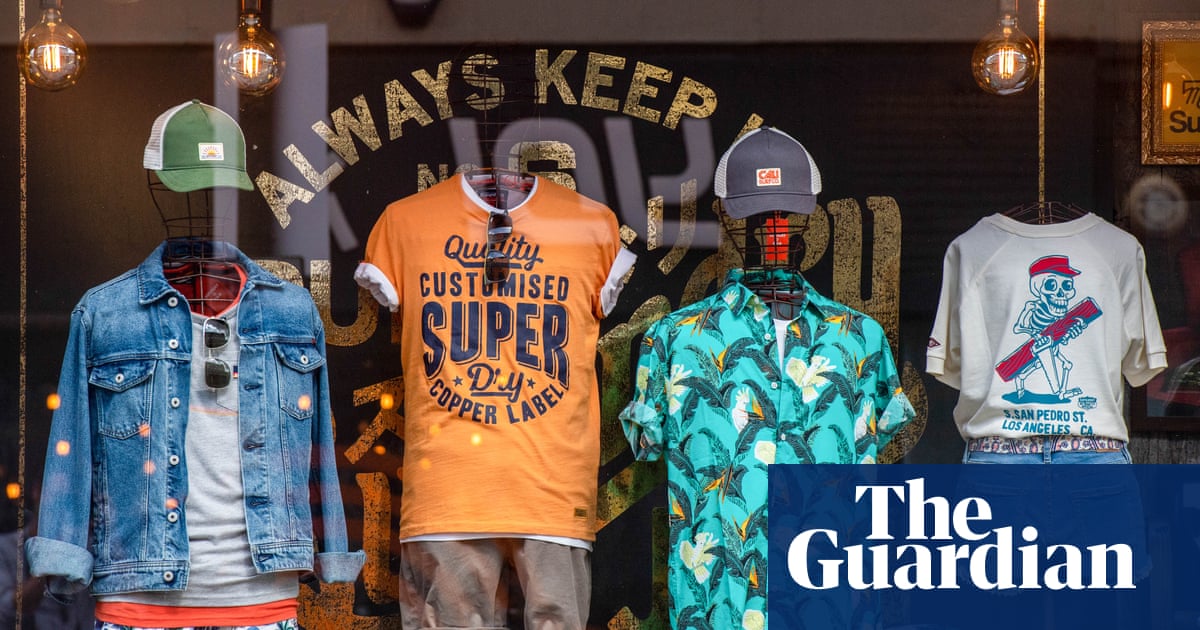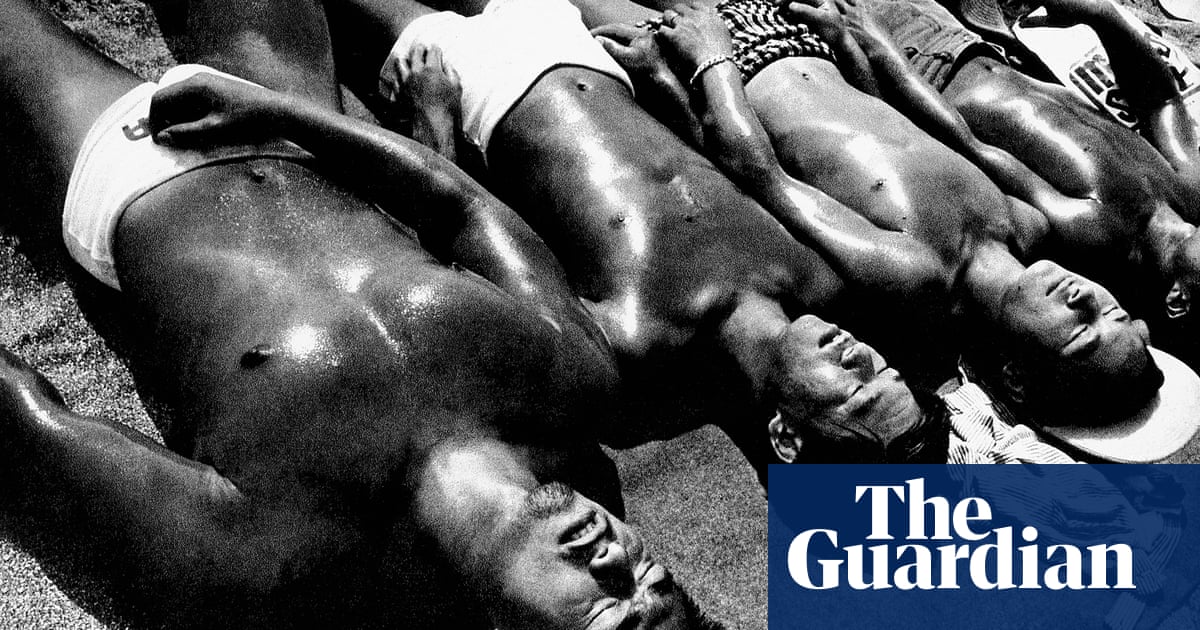
am old enough to remember the Wimpy chain in its 1970s table-service pomp: ketchup squirted from plastic tomatoes, with a red congealed scab around the nozzle to pick at when you were bored, and a menu item called a Bender Brunch, featuring two sausage rings and absolutely no awareness of current playground slang. There was also the Golden Egg, a mildly polished greasy spoon chain which colonised British high streets in the 1960s, with its egg-shaped menu of egg-heavy dishes.
I search up an image of that menu online. It includes a Salmon Triumph and what a triumph it is: fishcakes, chips and a fried egg, because at the Golden Egg everything came with a fried egg. Follow that with three shillings worth of Jamaican Longboat: “a split banana, generously served with ice-cream, topped with fruits and fresh whipped cream”. The word “generously” is doing a lot of heavy lifting in that menu description.
Behold the British restaurant chain, and the golden, fat-slicked thread that ties together these pioneers and the modern high street, clustered with the likes of Côte and Wagamama, Zizzi and Gourmet Burger Kitchen, Bill’s, La Tasca and Frankie & Benny’s. Now that we all speak fluent independent bistro, taqueria and live fire grill, we are, of course, meant to look disdainfully upon them and all their works. Which, in true Carrie Bradshaw style, raises the simplest of questions: are the chains a valuable part of the British restaurant landscape?
Obviously, there are terrible examples; ones that make you want to sandpaper your own tongue to kill the memory. They are where ingredients, good employment practice and hope go to die. I once ate at an airport Frankie & Benny’s. The barbecue sauce on the ribs was so violent it made my eyeballs vibrate. Leaving the country felt like a reasonable act of protest. But we shouldn’t let the dismal set the agenda. Bender Brunches aside, the originals, such as Wimpy and the Golden Egg, were where many people of a particular generation learned the grammar and vocabulary of eating out. Likewise, their modern iteration can be exactly what we need in the right circumstances.
A few days before the lockdown, I went to the Pizza Express on Dean Street in Soho. It was one of the first of the group, launched by the late and bloody marvellous Peter Boizot on nearby Wardour Street in 1965. Dean Street opened in 1969 with its music room, which has played host to many of the greats of jazz. (Oh, and me.) I went that day primarily to see my friends Joe Webb and Jamie Safir, two of the biggest talents of British jazz piano, play duets on a brace of shiny Steinways.
But I had an ulterior motive. As the world shook on its axis, I craved a Pizza Express American Hot with extra anchovies on a thin, crisp Romana base. I don’t eat pizza much, what with their glorious, heat-blistered, gluten-rich, carb-heavy crusts. To me they’re blue meth, straight out of Walter White’s lab. That American Hot did indeed make me very happy. But it wasn’t just the food. It was the emotional connection to a curling-logoed brand: one that fed me as an impoverished young man, made me feel like an adult when I was the parent of small kids, and was caring for me now, as the darkness approached.
Last October Pizza Express made headlines. The 470 UK branches were carrying a debt of £1.6m each. Social media nodded. It had lost its way. Some criticisms were fair. There had been too much discounting, alongside rising prices, and the menu had grown ever longer in an attempt to be the British public’s private dancer; to be whatever you wanted it to be. But, for people like me who had grown up with it, the essentials remained in place. This was reinforced by a Twitter thread from the writer Chris McCrudden who looked in detail at the company. As he said: “The underlying finances are sound.” However, it had been traded between a succession of venture capital companies, each one loading it up with debt, before extracting profit by selling it on.
Which points up the real issue with restaurant chains: the tension between making money and making food. Nobody but a fool launches a small independent restaurant thinking it will make them money. Nobody but a fool invests in turning a small independent restaurant into the cornerstone of a brand, without planning to make money. It’s how they go about the latter that’s the issue.
In 2014, my friend Nisha Katona, a colleague on BBC Radio 4’s Kitchen Cabinet, opened the first Mowgli in Liverpool, serving her version of Indian home cooking. She had such low expectations that she was still practising as a barrister and insisted on a two-year break clause in the lease. There are now 10 branches. “I had the first offer of investment within a few weeks,” she says. The money people were hungry for a brand. She didn’t take any for years. “Too many chains are run by accountants,” she says. They are, she says, people who don’t understand food. She has a point. When I reviewed the original Jamie’s Italian, I suggested it would do just fine. Eventually, I received more complaints about the chain than any other, as the food deteriorated. The end result: closures, mass redundancies and suppliers unpaid. Similarly, burger chain Byron was run on such tight margins, hoping for profits from scale, that when beef prices went up, they were in trouble.
So what’s the key to a successful chain? Katona says: “Look for peasant food from across the globe that uses every bit of the ingredients.” It makes sense. I have long been a huge fan of Nando’s. The proposition – grilled chicken and chips, and oh, those chicken livers – is clear and simple. It’s done well. It’s obviously why pizza works well, too. The challenge is scaling it up.
The markets near where I live in Brixton have spawned two great chains: Franco Manca, knocking out chewy-crusted sourdough pizzas at modest prices – the basic is around a fiver – and Honest Burger. Both now have dozens of branches. I expect the comments section beneath this piece online to stack up with dismissive, sweaty-palmed outrage. But I ate at the originals and their later outposts. Both still did the thing. Honest Burger still hand-cuts its own chips. Which leads me to this. If you want to dismiss the very notion of a good restaurant chain as a contradiction in terms, go right ahead. Knock yourself out. But be aware: you may be missing out on the good stuff.
News bites
The London-based, dozen-strong Pizza Pilgrims chain is going nationwide… kinda. They have launched the Frying Pan Pizza Kit. Each kit comes with the ingredients to make two margherita pizzas, using just a frying pan and a grill. According to the website ‘each kit sold helps us pay and support our staff in this difficult time.’ At time of writing, they hadn’t revealed the price. Visit pizzapilgrims.co.uk for more info.
Staying on the subject of chains, the Feed NHS campaign, spearheaded by Leon alongside the likes of Dishoom, Franco Manca and Wasabi, has so far raised over £1.1m. The money is being used to get 6,000 meals a day into London hospitals for critical care staff, with a plan to roll the programme out nationwide. It’s a not for profit project. To donate visit https://www.justgiving.com/fundraising/feednhs.
We know the fishing industry has suffered greatly in the current crisis. Fish and seafood wholesalers The Upper Scale, who normally deliver to hotels and restaurants out of Billingsgate, have launched a home delivery scheme within the capital. The extensive offering includes fresh fish, smoked fish and shellfish. The minimum order is £20. Visit theupperscale.co.uk.












